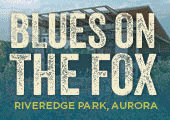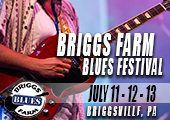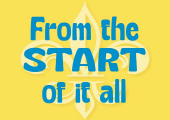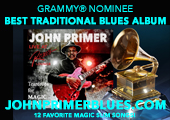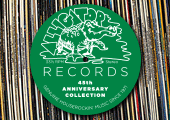SHEMEKIA COPELAND
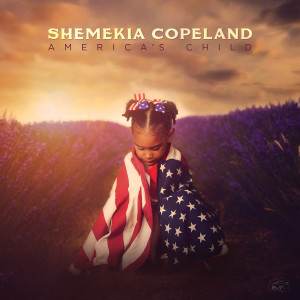
America’s Child
Alligator Records – ALCD 4984
Listen to this album! That’s the only review that some albums need, and Copeland’s powerful, ferocious, clear-eyed and hopeful new release is one of those albums. It’s clearly one of the best albums of this year not only because it’s so timely—the opening song gloriously proclaims that Copeland and her chorus of backing vocals “ain’t got time for hate”—but also because Copeland’s in such control of her voice that she can scream at injustices in the measures before she soothes with loving hope. America’s Child, produced at the Butcher Shoppe in Nashville by Will Kimbrough—who also plays stunning lead guitar, as well as organ, on all but one of the tracks—features a stellar cast of players and singers, ranging from Emmylou Harris, John Prine and Steve Cropper, to Mary Gauthier, Al Perkins and Gretchen Peters, among many others.
Kimbrough’s chicken-picked lead riffs forcefully open Ain’t Got Time for Hate and Copeland then joins with her commanding vocals. Kimbrough sets a propulsive pace for the tune, driving the questions and affirmations that Copeland shouts out over the music as it builds to a crescendo, with Kimbrough’s guitar playing call and response with Al Perkins’ steel guitar surrounded by a chorus of voices lifting the words “ain’t got time for hate” to exalted heights. Copeland plainly shouts out a vigorous emotional plea: “It’s the law of the jungle / it’s the law of the land / we hold each other’s hearts in the palms of our hands / we ain’t got time for hate.” This opening song is worth the price of the album, but it only gets better. Copeland delivers a funky version of Mary Gauthier’s Americans, a tongue-in-cheek reminder of the glorious nature of America’s human diversity: “There’s an Elvis impersonator / riding in an elevator / a Hindu from Yucatan / asking to shake his hand / an Orthodox Baptist Jew / wondering what would Jesus do / Americans / still free to be you and me.” The minor-chord swampy blues Would You Take My Blood? zeroes in on an uncomfortable question that peels away our differences: “You made it clear a thousand times / that you think I’m not your kind / but if your life was fading fast / your next breath was your last / no place for you to go / here’s what I would like to know / would you take my blood? / would you take my blood? / or would you rather die than share your life with mine / I’m reaching out to you / would you take my blood?” John Prine joins Copeland on the dark and stormy Great Rain; at the end of the song, Prine exclaims, “all right, take the rest of the day off.” Rhiannon Giddens’ banjo provides the layers for Copeland’s heart-rending pleas for something real and for Kimbrough’s resonator in Gauthier’s Smoked Ham and Peaches. Copeland’s version of her father’s Promised Myself is sure to become a soul classic; Steve Cropper provides his magic on the crispy riffs and chords that provide the cozy quilt for the lyrics; his lead bridge is one of those magic moments in music that sends shivers up your spine.
You have to listen to America’s Child. Put it on a turntable and never take it off, or in a CD player and never take it out. Copeland provides a soundtrack for contemporary America; she asks uncomfortable, honest questions and her powerful expression of them in her music demands that we listen without ceasing and even take some action. Each song on the album takes her music to the next level, making America’s Child her best album yet.
—Henry L. Carrigan Jr.
BUDDY GUY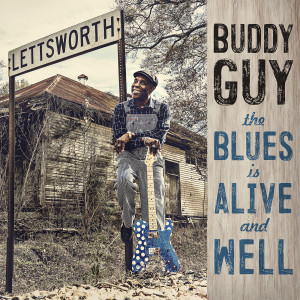
The Blues Is Alive and Well
RCA – 19075-81247-2
If nothing else, Buddy Guy himself is certainly alive and well, carrying the blues torch around the world with an aggressive panache that would be impressive in a man half his age, and which is almost unimaginable for an 82 year old.
As if in grateful acknowledgment of his near-miraculous longevity, this set is characterized by a feel of almost autumnal introspection. Although there are is still plenty of fire-on-the-fretboard virtuosity on display, Guy sounds determined to prove that he’s also still capable of genuine emotional and musical depth. The opener, A Few Good Years, sets the tone—introspective, even brooding, it finds both his singing and his playing graced with a subtlety he doesn’t often reveal these days. On the title song, Guy invokes psychic turmoil through understatement rather than overkill—his guitar solo even includes a haunting quote from Otis Rush’s All Your Love (I Miss Loving)—and he’s all the more effective for it. Blue No More could almost pass for a long-lost Charles Brown offering (although guest vocalist James Bay could have easily—and mercifully—stayed home).
Whiskey for Sale, featuring an uncharacteristic (and, to my ears, annoying) synthesized drum loop from producer/percussionist Tom Hambridge, nonetheless grinds with vintage streetsy toughness; Bad Day may ruffle a few feathers with its macho signifying, but Guy’s protagonist makes it clear that at least some of his anger arises from the racist mistreatment he’s received. More good-natured, but no less intense, is the rogue’s anthem Guilty as Charged. Cognac, featuring acolytes Jeff Beck and Keith Richards, is predictably overstuffed with multi-note fretboard barrages, but even here things remain pretty tasteful, especially by Buddy’s latter-day standards. Mick Jagger weighs in with an unexpectedly rich and evocative harp solo on You Did the Crime. Guy offers up a tough-edged take on Sonny Boy Williamson’s Nine Below Zero; he invokes John Lee Hooker on Ooh Daddy, and he reprises the classic guitar intro from Muddy’s Still a Fool with eerie verisimilitude on Somebody Up There. The closer, a brief Milking Muther for Ya, harks back to the many recorded versions of the old “Dozens” toast.
Willie Dixon, one of Buddy Guy’s mentors and compatriots, adopted the phrase “I Am the Blues” as his personal slogan. Today, despite the criticism that occasionally comes his way, Guy might legitimately lay claim to that aphorism and its legacy.
—David Whiteis
FANTASTIC NEGRITO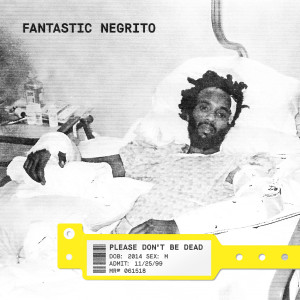
Please Don’t Be Dead
Cooking Vinyl / Blackball Universe – COOKCD705
At first glance, the cover art for Fantastic Negrito’s new release Please Don’t Be Dead is arresting—it’s a photograph of Xavier Dphrepaulezz battered and bandaged in a hospital bed. Other images show the 1999 car wreck that put him there and his permanently damaged right hand (see feature in this issue). Yet the Oakland, California–based artist overcame this and more to resurrect his music career, winning the 2017 Best Contemporary Blues Album GRAMMY for his first album as Fantastic Negrito, The Last Days of Oakland. The music inside is equally arresting. A triumphant, firebrand amalgam of blues, rock and soul, Please Don’t Be Dead heralds an artist who’s fully come into his own.
Prince was one of Dphrepaulezz’s musical inspirations, and his influence can be heard throughout the album’s 11 original songs, especially on tracks like Bad Guy Necessity. But make no mistake—Dphrepaulezz’s voice, music and message is his alone. The pull-no-punches lyrics (“Everybody needs a bad guy / Someone they can point the finger at and blame”) are paired with an irresistibly funky beat that draws you in while bringing the point home. That’s his modus operandi throughout, and it works beautifully.
His tenor vocals are wonderfully malleable—from screams, bluesy growls and purrs on Bad Guy Necessity and The Duffler, to pure and full-throated on A Cold November Street, to tender and folk-like on the haunting Dark Windows. His music is an intoxicating kaleidoscope of sounds—thundering hard rock riffs laced with gospel on Plastic Hamburgers; raw blues grooves bridged with snippets of soul and Beatles-esque pop on Transgender Biscuits; abyss-deep blues moans paired with grinding guitar licks and soaring organ on The Suit That Won’t Come Off.
There are some thematically dark moments here. Yet, Dphrepaulezz scatters hopeful messages throughout: “Break out these chains,” “get unified,” “never give up.” If one lyric could summarize the entire album, it would be “Take that bullshit / And turn it into good shit,” from the upbeat closing track Bullshit Anthem. Packed with brilliant writing and masterful musicianship, Fantastic Negrito’s Please Don’t Be Dead is a righteous call-out to an ailing America. Listen up.
—Melanie Young
VARIOUS ARTISTS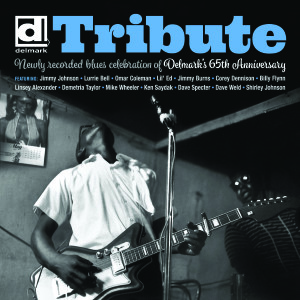
Tribute: Delmark’s 65th Anniversary
Delmark Records – DE856
Hot off of the recent performances at the June 8, 2018, Chicago Blues Festival in Millennium Park, the good vibes were still flowing throughout Tribute, a collection of artists paying homage to many of the main attractions that sustained Bob Koester and his dynamic blues dynasty. As one of the last projects to come off the assembly line before the label was sold on May 1, 2018, Delmark’s 65th anniversary recording taps the current roster (plus Lil’ Ed, on loan from Alligator) who have been specially selected to represent their respective legends. Mostly recorded in two separate sessions between the end of 2017 and early 2018, the time and energy invested in creating such a historic Chicago blues celebration is extensive, and the results are, as expected, quite excellent.
It is also a great testament to the Delmark label and the Chicago Blues Festival organizers to pull off the feat of having every featured artist on the album perform their tunes (and two extra tributes to Willie Kent and Eddie Shaw) in a two-hour show premiering the music on this disc. Guitarist Guy King, vocalist Tomiko Dixon and saxophonist Hank Ford also joined in on the fun.
Things get off to a perky start as the album opens with Train I Ride by Omar Coleman, a local staple and rising star of Chicago blues/funk harp. His contribution is dedicated to the man who still holds the record as the biggest selling album on the label—Junior Wells and his Hoodoo Man Blues from 1965. One Day You’re Gonna Get Lucky is a patented blues shuffle, a four-cylinder engine revved by the Bell Dynasty led by Lurrie and his brothers—rhythm kings Tyson on bass and James on drums and Steve on harp—who conjure up legendary dad Carey’s fire and flair better than anyone on the planet. Backed by guest Eddie Taylor Jr., Lurrie’s lead guitar solo on this track is spectacular.
Speaking of which, the senior Eddie Taylor’s daughter, Demetria Taylor, gleefully delivers sweet and dirty growls in her vocals on Riverboat in honor of Big Time Sarah, while Billy Flynn gets down with fat guitar licks. Linsey Alexander’s vocals are strong when he delivers the lyrics to All for Business, and the spirit of a young Jimmy Dawkins comes through alive and well in the tone and phrasing of Billy Flynn, whose biggest mentor was Dawkins himself—and it shows. Jimmy Burns offers Big Joe Williams’ She Left Me a Mule to Ride and serves up a stellar solo performance as he accompanies himself with patented guitar picking while unleashing gritty lyrics.
Speak My Mind from Lil’ Ed & Dave Weld is right in the pocket, with wicked slide and urgent vocals. “I liked-ed that one, it felt good!” exclaims Lil’ Ed when the smoke clears. Indeed, his uncle and mentor J.B. Hutto would have been proud of this nod to him from his Lil’ blues nephew. Out of Bad Luck is a spot-on tribute to Magic Sam, with Jimmy Johnson on uncanny Magic-laden vocals and lead guitar and Dave Specter backing him up with some reverb-and-tremolo-tinged firepower of his own.
Broke and Hungry is a rugged-road acoustic arrangement coming from the aptly chosen Tennessee native Corey Denison on acoustic guitar and vocals, while Gerry Hundt plays mandolin and violin on this Sleepy John Estes tune. Mike Wheeler then follows with So Many Roads, a straightforward and clean version that does justice to Otis Rush, yet preserves his own personal style and taste.
Need Your Love So Bad is a Shirley Johnson tribute to Bonnie Lee—what a refreshing voice Johnson has for this tune—so subtle and smooth. Even more impressive, though, is the note-for-note perfected B.B. King tone and inflection by Billy Flynn. The King is definitely smiling down on Billy for this one.
Dedicated to Roosevelt Sykes, Boot That Thing is a solo boogie-burner by Ken Saydak, who provides a rollicking piano and flat-out gnarly vocals that close the bar down. A former Chicago mainstay (he’s moved to Colorado), Saydak was instrumental in contributing a substantial amount of original material to Delmark’s recently released Rockwell Avenue Blues Band album, Back to Chicago (DE 854).
While the lion’s share of Tribute was produced by Steve Wagner, it just wouldn’t have been complete without some finishing touches provided by Dick Shurman, whose experience, wisdom and advice is impeccable—having his hands at the wheel as assistant producer is always a good thing. Witnessing this 65th anniversary session come to life at the Chicago Blues Fest was a rare treat for blues lovers everywhere, and this disc now serves as a permanent musical monument to that auspicious occasion. No one deserves the honor of both events more than Bob Koester, whose reputation and lifelong body of work stands alone.
—Wayne Goins
BOZ SCAGGS
Out of the Blues
Concord Records – CRE00697
Boz Scaggs might be best known for his radio hits of the ’70s, such as Lowdown and Lido Shuffle, and that’s a shame, for he’s one of the most consistently inventive rhythm guitarists around, and his soulful vocals easily find a place among those of Solomon Burke and Bobby “Blue” Bland. Out of the Blues, the final album in the unofficial trilogy that includes Memphis and A Fool to Care, showcases Scaggs’ dazzling ability to make a song his own with his intuitive guitar stylings and his vocal ingenuity. He’s joined on this album—which includes versions of songs made famous by Bland, Jimmy Reed, Magic Sam and Neil Young—by a stellar cast of players, including Doyle Bramhall II, Ray Parker Jr. and Charlie Sexton on guitars, Willie Weeks on bass, Jim Keltner on drums, Jim Cox on keyboards and Jack Walroth on harmonica.
The album opens with the jazz rocker Rock and Stick, which features shimmering and shivering rhythm guitars, crisp leads and haunting vocals, punctuated by Walroth’s bending harmonica runs on the bridge. The song’s sonic structure recalls Fleetwood Mac’s Hypnotized. On his version of the Bobby “Blue” Bland tune I’ve Just Got to Forget You, Scaggs demonstrates that he belongs to the world of soul singers with his smooth, seductive, sultry phrasing and his ability to sing within all registers. The musical arrangement itself is straight out of Stax, with horns floating over crispy and fluid guitar work. Scaggs’ version of the blues chestnut I’ve Just Got to Know is a slow-burning piece of elegance, with tinkling keys moving under a swaying rhythm guitar and Scaggs’ gravelly vocals. Radiator 110, written by Walroth, opens with riffs from Neil Young’s Cinnamon Girl—and that song’s rhythmic structure lies under the entire song—and marches into a choogling, blues rock, funk tune. Scaggs and Walroth’s Little Miss Night and Day is pure rockabilly fun, a song that scampers off its grooves, and surely a song written with the ghost of Chuck Berry hovering just over the writers’ and the band’s shoulders. Scaggs performs a poignant, moving slow blues version of Neil Young’s On the Beach, capturing the song’s themes of loneliness and the search for some order and harmony in life, which can be found in nature but not often in a world that continues to turn, oblivious to humanity and its concerns.
Out of the Blues is a highlight in Scaggs’ catalog. Scaggs delivers an album filled with elegantly produced arrangements that take the songs to places we might not expect them to go; the musicians build the songs layer by layer, and Scaggs’ clear and strong vocals float over the music as the songs sail out of the blues and into our souls.
—Henry L. Carrigan Jr.
MARCEL SMITH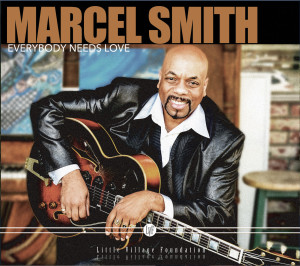
Everybody Needs Love
Little Village Foundation – LVF 1019
Sacramento singer and multi-instrumentalist Marcel Smith was still in his 20s when he first recorded back in 1993 for the hometown Have Mercy imprint as a member of a group called the Soul Prophets. With Smith’s soul-searing vocals and Robert Nakajima’s fire-spitting guitar, that set, Coming From the Old School, ranks as a serious contender for the Best Album That Nobody Heard award, but apart from recording the 1994 Have Mercy CD Old Time Religion as a member of Sacramento’s W.D. Gospel Singers, Smith has apparently not returned to the recording studio until this effort a quarter-century later.
Now, courtesy of keyboardist Jim Pugh’s Little Village Foundation, we finally have Smith’s first recording under his own name, and it’s a good ’un. Produced by Pugh, Kid Andersen and Rick Estrin, the result is a well-crafted album in the manner of the label’s previous efforts with Wee Willie Walker and John Blues Boyd. As Estrin aptly notes, Smith sings like “a fully mature cross between Sam Cooke and Wilson Pickett,” while as a guitarist he sometimes recalls Robert Ward’s Magnatone tremolo. The 12-track playlist contains no original material, opting instead for an eclectic and unusual choice of covers that mixes gospel with soul and pop. Thus, we get the gospel chestnuts What a Friend We Have in Jesus and This Little Light of Mine along with selections of sacred fare from the Soul Stirrers and the Five Blind Boys of Mississippi, the title track from the Temptations by way of Gladys Knight and three lesser-known selections from the Cooke songbook in Keep Movin’ On (with an assist from labelmate Walker), Hold Me and That’s Heaven to Me. Bobby Womack’s Harry Hippie and the Hollies’ He Ain’t Heavy, He’s My Brother are the most unorthodox selections, and the program concludes with a beautifully controlled reading of Nat King Cole’s Looking Back, a song also favored by Otis Rush.
It’s been a long wait to hear Marcel Smith get a chance to fulfill the promise of those first recordings for Have Mercy 25 years ago, but we can rejoice that the follow up is here at last and that it shows Smith to be at or near the forefront of contemporary singers. Hopefully, we won’t have to wait so long to hear him again.
—Jim DeKoster
ELVIN BISHOP’S BIG FUN TRIO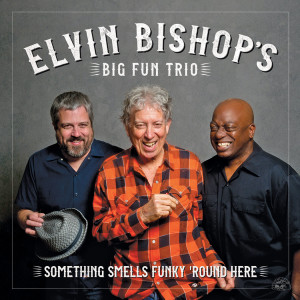
Something Smells Funky ’Round Here
Alligator Records – ALCD 4983
Elvin Bishop first gained recognition as a member of the pioneering Paul Butterfield Blues Band in the 1960s. Since his tenure with Butterfield, Bishop has carved out a niche for himself by mixing electric blues with his inimitable folksy sense of humor. When Bishop’s Big Fun Trio released their self-titled debut last year, listeners got to hear Bishop perform in a stripped-down format that upped the musicianship. Something Smells Funky ’Round Here, the trio’s new release, features more of the tight chemistry and joyous camaraderie that made their debut so memorable.
Blues fans who are frustrated with the nation’s current leadership will relate to the album’s title track. While Bishop and Willy Jordan gleefully trade potshots at the White House’s current occupant, listeners can detect a genuine sense of outrage behind the humor. In the last year, this trio’s chemistry has grown so strong that the music seems to flow effortlessly. Willy Jordan’s cajón (a South American percussion instrument) sounds almost indistinguishable from a regular drum kit, and Bishop and Bob Welsh’s guitars weave together beautifully. Bishop and Jordan have a blast with the raunchy lyrics to That’s the Way Willy Likes It. The high-octane instrumental Stomp showcases Bishop’s slide guitar chops. The raucous groove will bring back memories of Hound Dog Taylor—Welsh’s distortion-drenched rhythm riffs would make Brewer Phillips proud. On Bob’s Boogie, Welsh puts down his guitar and demonstrates his formidable chops on piano while Jordan’s cajón holds down the backbeat.
One of the album’s most striking tracks is a cover of the Jackie Wilson hit (Your Love Keeps Lifting Me) Higher and Higher. While Wilson’s 1967 recording had the legendary Funk Brothers holding down the groove, Bishop’s trio manages to capture the tune’s infectious energy with nothing but two guitars and percussion. Welsh’s sense of rhythm is impeccable, and Jordan’s soaring vocals bear an uncanny resemblance to Sam and Dave’s Sam Moore. Elvin Bishop’s Big Fun Trio clearly loves making music together, and it’s great to hear a veteran like Bishop sound so invigorated in the studio. Longtime fans will want to give Something Smells Funky ’Round Here a listen and perhaps catch one of the trio’s many upcoming live dates.
—Jon Kleinman
STEVE HOWELL AND THE MIGHTY MEN FEATURING KATY HOBGOOD RAY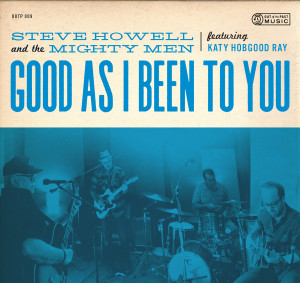
Good as I Been to You
Out of the Past Music – OOTP 009
East Texas guitarist Steve Howell and the Mighty Men are back again, delivering their versions of classic Americana songs, ranging from Lead Belly’s When I Was a Cowboy (Out on the Western Plains) to Bob Crewe and Bob Gaudio’s The Sun Ain’t Gonna Shine Anymore. Howell is a world-class blues fingerpicker, and he’s joined by Chris Michaels on lead guitar, Dave Hoffpauir on drums, Jason Weinheimer on bass and organ and Katy Hobgood Ray and Dave Ray on vocals.
The album opens with a swampy, funky, choogling version of the Andre Williams’ tune Bacon Fat. Michaels’ lead guitar sizzles as Howell fries up a mess of fatback blues with his vocals. Katy Hobgood Ray and Howell turn in a slow-boiling version of Lead Belly’s When I Was a Cowboy (Out on the Western Plains); the sonic structure of this version resembles the songs of Eric Burdon and the Animals. Katy Ray delivers a lively, sprightly roots ramble on Memphis Minnie’s New Dirty Dozens [sic]; Howell’s guitar work and the lilting tempo of the song recall the work of Bruce Robison and Kelly Willis. The band’s slowed-down version of the Gene Pitney hit It Hurts to Be in Love invites us out on the floor for a slow dance. Blues in the Bottle, written by Prince Albert Hunt, opens with a riff resembling Reverend Gary Davis’ version of Keep Your Lamps Trimmed and Burning; Howell and the Mighty Men’s slow-burning folk-blues version recalls the fingerpicking of Jorma Kaukonen, David Bromberg and Larry Campbell; the song is the highlight of the album. Ray tackles Lead Belly’s Easy Rider in lilting, radiant vocals, backed by the cascading fingerpicking of the guitars. The quiet beauty of the song shines brightly in this version. The band slows down the pop hit The Sun Ain’t Gonna Shine (Anymore), but this version will take a little time to grow on its listeners. The album closes with the acoustic jazz blues of You Gonna Quit Me Baby, a moving little tune written by Blind Blake.
There’s no question that Steve Howell and the Mighty Men are good to us and are treating us to fine blues on Good as I Been to You. The band knows how to get inside these songs and turn them inside out, delivering new versions that preserve the beauty and power of the originals while sharing new musical discoveries in these versions.
—Henry L. Carrigan Jr.
KAT RIGGINS
In the Boys’ Club
Bluzpik – No #
Kat Riggins is a husky-voiced vocalist whose compositions span the stylistic gamut from the intentionally retro (Troubles Away, featuring some tasteful ragtime picking from guitarist Darrell Raines, is even electronically tweaked to sound like a vinyl record) to the aggressively contemporary (Try Try Again and Johnnie Walker explode with roadhouse-rocking fury).
Despite the taut muscularity of her timbre, Riggins is a supple singer, negotiating challenging melodic intervals even at her most rocked-out and aggressive (Fistful O’ Water). Her emotional palette is wide and deep, as she stakes her claim as a combative woman of power (Kitty Won’t Scratch, Cheat or Lose) while being unafraid to show vulnerability. Even at her most emotionally wracked, she summons a bracing courageousness (Hear Me, Tightrope). The Stax-flavored Second to None is a soul love testimonial in the great tradition; on Don’t Throw Me Away, a loping 12-bar blues, she comes off as both pleading and resolute.
Everything Riggins sings is charged with intensity, but she sounds especially focused in her anthems of empowerment. “I ain’t no damsel in distress,” she proclaims in the title tune, “in fact I’m mighty tough . . .” Live On both celebrates life and challenges us to find the courage to live it to its fullest; Try Try Again, showcasing her voice at its toughest and most uncompromising, invokes the aphorisms and life lessons of her elders—an updating, in a way, of such classic paeans to soul survival as Jerry Butler’s Only the Strong Survive. She also sings, in a brief (and uncredited) a cappella hymn, “I am a living testimony / I should’ve been dead and gone, but Lord, you let me live on.” In that spirit, Kat Riggins offers up a set that’s funky, danceable, inspiring and musically well crafted—let’s hope we hear a lot more from her.
—David Whiteis
BOB CORRITORE & FRIENDS
Don’t Let the Devil Ride
VizzTone – SWMAF-12
Harmonica slinger Bob Corritore was introduced to the blues as a 12 year old growing up in Chicago when a Muddy Waters tune on the radio caught his ear and changed his life. After establishing himself as a first-call sideman and producer and following a move to Phoenix in 1981, Corritore became the de facto “Blues Impresario” of the desert.
Soon after decamping to Phoenix, Corritore was joined by several Chicago-area blues cohorts, including Louisiana Red, and he went on to perform with a who’s who of southwest blues heavyweights including Big Pete Pearson, Buddy Reed and Tommy Dukes. In the ’90s, he opened the Rhythm Room, a seminal Phoenix blues club, and began hosting a weekly blues radio program on KJZZ, a gig he continues to hold down. Despite a decidedly full plate, Corritore has released several solo albums since his first CD release in 1999.
Not content to be a mere club owner, Corritore doubled as the leader of the Rhythm Room All-Stars, the outstanding house band that backed many of the performers who passed through town. He was also able to arrange studio time with many of these artists and reportedly has an extensive vault of recordings at his disposal. The mix of covers and originals for Don’t Let the Devil Ride are derived from various recording sessions between 2014 and 2017.
The disc kicks off with Willie Buck handling vocals on the shuffle of Went Home This Morning, a tight number that features excellent upper register harp work by Corritore. The slinky, jazzy guitar of Jimi “Primetime” Smith and the back porch beat by drummer Marty Dodson complement the gravelly delivery of vocalist Oscar Wilson on the up tempo Tell Me Mama.
Sugaray Rayford’s playful delivery on The Glide, along with the delicate piano of Fred Kaplan, give the song a John Lee Hooker vibe. Frequent Corritore collaborator Alabama Mike lends his powerful church house tenor to three songs (Laundromat Blues, Don’t Let the Devil Ride and Lovey Dovey Lovey One), with the slow burn Laundromat Blues being one of the most powerful on the disc. The song features simmering guitar by Big Jon Atkinson and note-perfect barrelhouse piano by Bob Welsh, while Corritore reaches for a bottom-heavy harp tone that sounds as if it were conjured from deep inside the earth.
Corritore’s harp pairs perfectly with the guitar of Danny Michel and George Bowman’s urgent vocals on the ballad I Was a Fool. Bassist Troy Sandow locks in with Dodson on drums to propel the funky groove of Blues Why You Worry Me?, which is also lifted by Michel’s tasty fretwork and Atkinson’s powerful vocals.
The disc closes with another frequent Corritore collaborator, vocalist Tail Dragger (a.k.a. James Yancey Jones), taking the mic on the smoldering Thundering and Raining.
Don’t Let the Devil Ride features great performances and a strong mix of up-tempo and gutbucket blues with a dash of funk, and provides a solid platform to display Corritore’s skills as a performer, arranger and producer.
—Rod Evans







